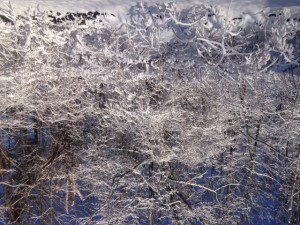 Whether we know it or not, we are all amateur translators. Instead of translating a poem from one language to another we put into words what previously existed without words: we translate experience into language. Mostly, we are unaware of this process and mistake our verbal productions for a ironclad truth.
Whether we know it or not, we are all amateur translators. Instead of translating a poem from one language to another we put into words what previously existed without words: we translate experience into language. Mostly, we are unaware of this process and mistake our verbal productions for a ironclad truth.
If we cling to the “truth” of our translations, then we are bound to feel stress, dissatisfaction, and even suffering, especially when we don’t account for the enormous gulf that separates experience and language.
Translation is difficult and it is more an art than mechanical process. A good translator tries to inhabit the mind of the subject and represent the words in way that has an emotional as well as literal truth. Different translators make different choices. Take for example the following three translations of Rilke’s poem, The Swan.
This laboring through what is still undone,
as though, legs bound, we hobbled along the way,
is like the awkward walking of the swan.And dying—to let go, no longer feel
the solid ground we stand on every day –
is like his anxious letting himself fallinto the water, which receives him gently
and which, as though with reverence and joy,
draws back past him in streams on either side;
while, infinitely silent and aware,
in his full majesty and ever more
indifferent, he condescends to glide.Translation by Stephen Mitchell from The Selected Poetry of Rainer Maria Rilke
This clumsy living that moves lumbering
as if in ropes through what is not done,
reminds us of the awkward way the swan walks.And to die, which is letting go
of the ground we stand on and cling to every day,
is like the swan, when he nervously lets himself down
into the water, which receives him gaily
and which flows joyfully under and after him, wave after wave,
while the swan, unmoving and marvelously calm,
is pleased to be carried, each moment more fully grown,
more like a king, further and further on.Translation by David Whyte from his book, Crossing the Unknown Sea
This toil and struggle—passing on, ponderous
and as if bound, through what remains undone,
is like the makeshift walking of the swan.And dying—this letting go
of that ground we stand on every day,
is like his uneasy letting himself down–:into the water, which receives him gently,
and which, as if happy in its passing,
withdraws, beneath him, wave on wave;
while he, quiet and infinitely assured,
with ever greater majesty and freedom
and serenity is pleased to glide.Translated by Edward Snow (1984) from New Poems
As you can see, each poem makes different choices about language. The differences are not merely synonyms in every case. Each poem expresses a different mood, a different sense of the swan as he walks down to the water and then moves within it. The each describe the same event, yet with a unique character. No one translation is more right and even if we were to read Rilke’s original german, we as readers are making our interpretations of the meanings conveyed in the poem.
I came across this quote by Proust recently:
Every reader as he reads is actually the reader of himself. The writer’s work is only a kind of optical instrument he provides the reader so he can discern what he might never have seen in himself without this book. The reader’s recognition in himself of what the books says is the proof of the book’s truth.
We are readers and translators of ourselves in every moment of existence. Here are some guidelines for making the most of these translations.
- Know that we are engaged in a translation task and make our best effort. We are aiming for the best approximation we can muster in this particular moment.
- Seek to improve our craft by getting to know our subject matter. In this case, the subject matter is our moment-to-moment lived experience that resides before and without language in our bodies, senses, and minds. To become experts, we practice. In other words, we improve our craft by cultivating an intimacy with our experience through mindfulness meditation.
- Be humble and recognize the limits of what we are doing. We are not producing truths but our best approximations of truth. Translations are always subject to revision. There is no final word, only the living process of breathing and translation.
We are well-served by this humility and commitment to the process. Mindfulness is integral to knowing ourselves well enough to make decent translations. We can also spend more time on the experience side of things and forego the compulsion to translate everything into words. Our goal, as Proust pointed out, is to read ourselves and to find an emotional truth in the moment.

